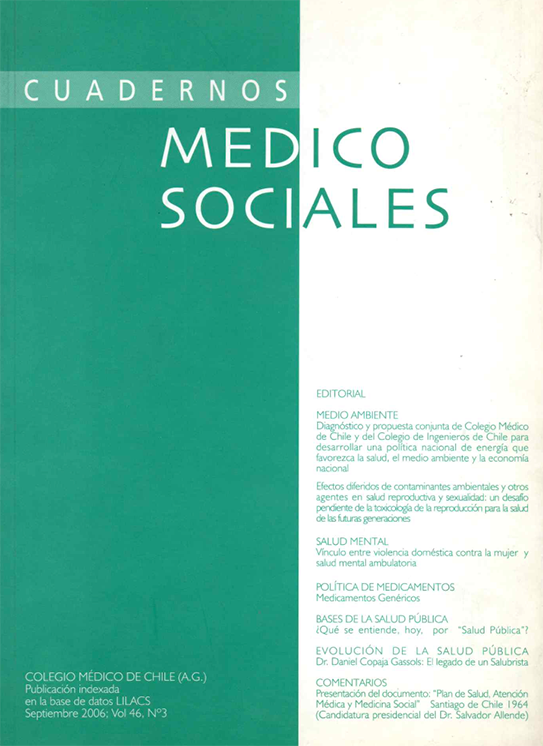Joint diagnosis and proposal of the Colegio Médico de Chile and of the Colegio de Ingenieros de Chile for a National Energy Policy in favour of human and environmental health and of economic development
Keywords:
polluting sources of energy, non conventional renewable energy sources, national energy policy, risks attributable to fossil fuelsAbstract
The Chilean Engineers’ Association and the Chilean Medical Association agreed to present this paper, containing information and proposals regarding prevention and control of the serious consequences – for health, the environment, the economy and national security – of the continued utilization of polluting energy sources in industry, transport and electricity generation. From the health standpoint, the Medical Association describes the atmospheric pollutants derived from fossil fuels and firewood; and it goes over their acute and chronic effects on respiratory, circulatory and cancer mortality and morbidity; the high resulting expenditure is indicated. The “greenhouse” effect is also referred to, with the direct impact of heat on persons and the indirect health damage through changes concerning vectors, agriculture and “natural” disasters. Attention is also drawn to the risks implied by the eventual introduction of nuclear energy. From the technological and economic viewpoint, the Engineers’ Association deals with the increasing price of fossil fuels, the control of the market by private agents, the lack of foresight of these agents in the case of natural gas imports and the submerged costs such as those of medical care requirements, infrastructure damage, reduction of competitive capabilities, dependence on foreign sources and the vulnerability of national enterprises. Both Associations indicate which are the required characteristics of energy sources – above all, that they should be non-polluting – and describe the viable technological alternatives: wind power, tides, marine currents, sunlight power, and hydrogen. Their present status is analyzed. A reference is made to other clean sources of lesser potential and to complementary measures such as energy saving and forestation. The Associations, with a sense of urgency, address their proposal to the government. This is based on the development of the non-conventional renewable sources of energy (ERNC) and on the advancement of the relevant scientific and technical capabilities in our country. The State should exercise its leadership role and articulate a much required National Energy Policy, which should be based on complete and trustworthy information. Concrete measures are proposed, including: a law of ERNC development and a National Fund to support the measures contained therein; the promotion of objective information on the issue throughout the whole society, including the educational system, the media, the private companies in the energy sector, the Universities, scientists, civic organizations and Professional Associationes.
Downloads
Downloads
Published
How to Cite
Issue
Section
License

This work is licensed under a Creative Commons Attribution-NonCommercial-ShareAlike 4.0 International License.


